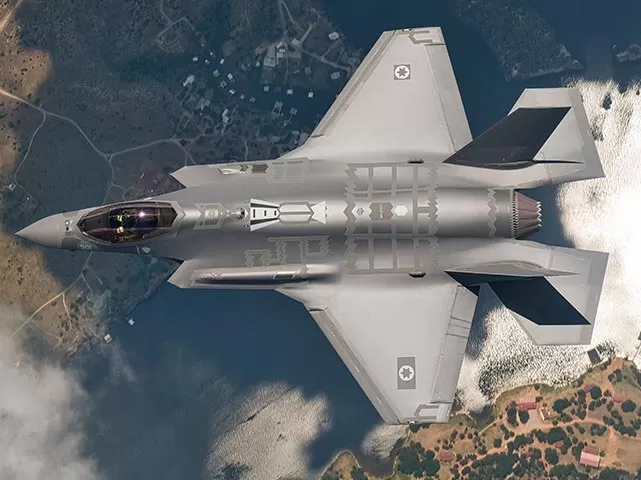
Israeli Tech Boosts F-35
From innovative helmets enabling pilots to see in total darkness to complex components in the aircraft's structure, Elbit Systems' ingenuity plays a critical role in the success of the world's most advanced fighter jet.
In a significant improvement to its military capabilities, Israel is set to receive another squadron of the advanced F-35i "Adir" fighter jets. This expansion continues the Israeli Air Force's growth and modernization efforts, addressing emerging strategic threats.
The journey of the F-35 in Israel began in December 2016, when the first two planes landed at the IAF's bases. Declared operational a year later, these fighters have since been integral to Israel’s defense, participating in numerous missions, including a notable operation on the night of April 13th, during the Iranian missile and drone attack.
Other than Israel, many countries around the globe utilize this significant platform, which is considered one of the most expensive and advanced aerial combat machines in the world today.
Although it has been a major success, not many are aware of the crucial role Elbit Systems plays in Lockheed Martin's global F-35 program. In fact, ever since it was first manufactured, Elbit Systems has been a pivotal contributor to this jet fighter.
A critical Partner
Michael, Business Development and Marketing Manager at Cyclone, a subsidiary of Elbit Systems, specializing in the design and manufacturing of aircraft parts, elaborated on Cyclone’s involvement in the project. "We started manufacturing small parts of the aircraft back in 2013," he said. "Through competitive bidding, we expanded to producing important sections like the weapon bay door. By 2020, during the peak of the COVID pandemic, we largely increased our production despite the challenges," he asserts.
Cyclone now manufactures numerous different parts for the F-35 chassis, being one of the main manufacturers of these parts for the global production line. These parts include components that are geometrically complex and made from composite materials, highlighting the advanced technological capabilities of the Israeli defense industry.
The F-35 project has not only bolstered Israel's defense capabilities but also set a benchmark for other projects within Cyclone and Elbit Systems. The company has been recognized as a strategic supplier, earning accolades such as Platinum Source status and the 2024 Strategic Supplier award from Northrop Grumman. Cyclone and 75 other suppliers were selected from 20,000 suppliers.
Michael highlighted the significance of these achievements: "Becoming a Platinum Source supplier allows us to perform our own part inspections, reflecting the trust our clients have in us. Our involvement in the F-35 program serves as a model for managing quality control and customer satisfaction in other ventures."
[caption id="attachment_22741" align="aligncenter" width="641"] Photo by: Lockheed Martin[/caption]
Photo by: Lockheed Martin[/caption]
Enhanced Maneuvering Without Looking Down
But it's not only the plane parts that Elbit has a role in, the helmet system is also a crucial part in this platform's operation. “The F-35 warfighter is one of the only platforms without a traditional Heads-Up Display (HUD),” says Vadim, VP of Business Development and Program Management for Helmet Mounted Systems and Sensors at the Aerospace division. “Instead, the helmet provides all necessary flight information directly to the pilot’s eyes using multiple technologies developed over decades by Elbit systems.”
"The F-35 warfighter is one of the only platforms without a traditional Heads-Up Display (HUD)," says Vadim. "Instead, the helmet provides all necessary flight information directly to the pilot's eyes using multiple technologies developed over decades by Elbit systems."
This ability allows pilots to keep their eyes on the target without looking down at the cockpit displays, which is vital during high-speed maneuvers and combat situations.
This helmet system, developed in collaboration with Collins Aerospace under the CEVS JV (Collins Elbit Vision Systems Joint Venture), is the only operational binocular display system globally. It includes features like night vision, allowing pilots to see in complete darkness, with accurate head tracking capability that combines 3 technologies magnetic/optical/inertial, making it an indispensable tool for night operations and aircraft carrier landings.
Earning a Global Reputation
By leveraging innovative production techniques and maintaining strict quality control, Elbit Systems ensured that its components met the demanding standards required for the F-35 program.
Michael pointed out that their success is largely due to their commitment to excellence and continuous improvement. "Our ability to deliver on time and maintain the highest quality standards has earned us a reputation as a reliable and essential partner in the F-35 program," he said.
Elbit Systems' role in the global F-35 program exemplifies the company's capability to contribute critical components to one of the world's most advanced fighter jets. This achievement is a testament to Israel's defense industry's innovation and resilience, solidifying its reputation on the global stage.
[caption id="attachment_22742" align="aligncenter" width="641"] Photo by: Lockheed Martin[/caption]
Photo by: Lockheed Martin[/caption]
The content of the article does not constitute business or financial information about Elbit Systems Ltd. (the "Company") and is not intended to be a basis for making investment decisions in the Company's securities. In order to obtain business or financial information about the Company, please refer to the reports and filings that the Company regularly publishes on the website of the U.S Securities and Exchange Commission (EDGAR) and on the notification system of the Tel Aviv Stock Exchange (Maya).
The article may contain forward-looking statements such as estimates, forecasts, estimates, plans, etc. that refer to future events that are considered forward-looking information as defined under the securities laws of Israel and the United States. There is no certainty that such information will be realized, in whole or in part, and the actual result may differ from what was presented in the article, among other things due to its dependence on external factors that are not under the control of the Company and that cannot be evaluated in advance. The forward-looking statements are based on the Company's estimates at the time of publication, and the Company has no obligation to update or correct this data.

